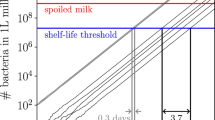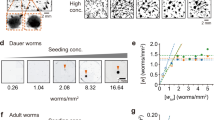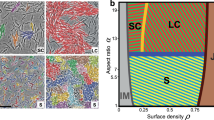Abstract
Cell suspensions from 5 human colonic carcinomas were fractionated by velocity sedimentation and plated in soft agar. Cluster formation was restricted to the purest fraction of epithelial cells, as had been determined by immuno- and histochemical criteria. Plating efficiencies for the 5 specimens were 1.0-4.5%. The effects of varying the incubation period and inoculum size upon growth were studied using unseparated cell suspensions from 6 specimens. Clusters were apparent after 3 weeks in culture, and maximum cluster formation was typically seen by 5 weeks. Cluster formation appeared concentration-dependent, and individual specimens varied with respect to the inoculum most conducive to growth. The maximum plating efficiencies for unseparated cells were unseparated cells were 0.4-1.7%.
This is a preview of subscription content, access via your institution
Access options
Subscribe to this journal
Receive 24 print issues and online access
$259.00 per year
only $10.79 per issue
Buy this article
- Purchase on Springer Link
- Instant access to full article PDF
Prices may be subject to local taxes which are calculated during checkout
Similar content being viewed by others
Rights and permissions
About this article
Cite this article
Kimball, P., Brattain, M. & Pitts, A. A soft-agar procedure measuring growth of human colonic carcinomas. Br J Cancer 37, 1015–1019 (1978). https://doi.org/10.1038/bjc.1978.147
Issue Date:
DOI: https://doi.org/10.1038/bjc.1978.147
This article is cited by
-
Cytotoxic activity of the thioether phospholipid analogue BM 41.440 in primary human tumor cultures
Lipids (1987)
-
Heterogeneity of human colon carcinoma
CANCER AND METASTASIS REVIEW (1984)
-
Tumor colony formation from human spontaneous tumors in a methylcellulose monolayer system
Research In Experimental Medicine (1984)



